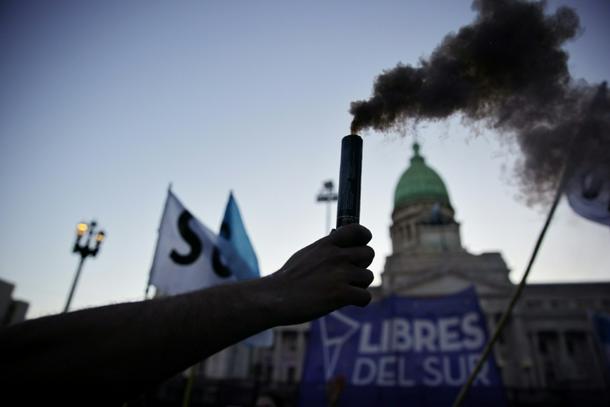
Demonstrators celebrated outside Argentina's Congress after senators overruled President Javier Milei's veto of spending increases for public universities and pediatric care
Buenos Aires (Argentina) (AFP) - Argentina’s struggling President Javier Milei suffered a new setback Thursday as Congress overturned his vetoes of laws increasing funding for public universities and pediatric care.
Senators invalidated both vetoes, which had already been rejected by the lower Chamber of Deputies, bringing to three the number of laws upheld by Congress despite vehement opposition from the budget-slashing Milei.
The vote comes as Milei struggles to end a run on the national currency, the peso, in the run-up to crucial October 26 mid-term elections.
Outside Congress, about 100 people celebrated the results.
Psychology student Tomas Bossi said he was proud of the outcome.
“We’ve been fighting and resisting the government’s atrocious underfunding of national universities for over a year,” he told AFP.
The 54-year-old Milei, in power since December 2023, has been on the ropes since his party’s trouncing by the center-left in Buenos Aires provincial polls last month.
Those elections, seen as a bellwether ahead of the mid-terms, shredded his aura of political invincibility and sent markets into a tailspin.
Last week, the US government announced it was in talks with Argentina on a $20 billion swap line aimed at shoring up the peso.
US President Donald Trump sought to buoy his close ally at talks in New York on the sidelines of the UN General Assembly, saying: “He’s doing a fantastic job.”
But after rallying briefly, the peso slumped again this week over market uncertainty about the amount and extent of the US financial help on offer.
Reflecting on Thursday’s veto override, Gustavo Marangoni, director of the M&R polling firm, told AFP that even if Milei fared better than expected in the mid-terms, he would still be far short of a majority in Congress and that there was pressure on him “both from within Argentina and beyond… to change his way of making decisions.”
- A ‘moral’ issue -
The Senate vote on Thursday was 59-7 to overrule Milei’s veto on pediatric emergency funding, including spending on the country’s biggest pediatric hospital. Three senators abstained.
Milei’s blockade of funding for public universities suffered a similar fate, with 58 votes in favor, seven against, and four abstentions.
Libertarian Milei came to office on a promise to revive Argentina’s ailing economy and tame runaway inflation by shrinking the welfare state.
He has dramatically reduced inflation and produced a budget surplus through deep cuts to public spending, which have affected public hospitals, universities and pensioners in particular.
The president, who has bet his mandate on balanced budgets, had justified his vetoes of spending increases by arguing that “there is no money” to fund them.
Martin Lousteau, a centrist senator, criticized Milei for “never talking about health or education” while constantly stressing the importance of Argentina meeting its debt obligations.
Left-wing Senator Daniel Bensusan argued that the debate over public funding was not “technical, fiscal, or accounting-related: it is political and moral.”
In an apparent bid to build momentum ahead of the October 26 vote, Milei on Thursday also introduced a new “Zero Tolerance” proposal to crack down on crime.
“We need zero tolerance, because those who commit crimes must pay the price,” Milei said in a brief campaign-style speech at a prison complex outside the capital.
The legislation would increase penalties for theft and homicide, while lowering the age of criminal responsibility from 16 to 13, among other provisions.
“It will now be up to Congress… to side with the victims or the offenders,” Milei said.